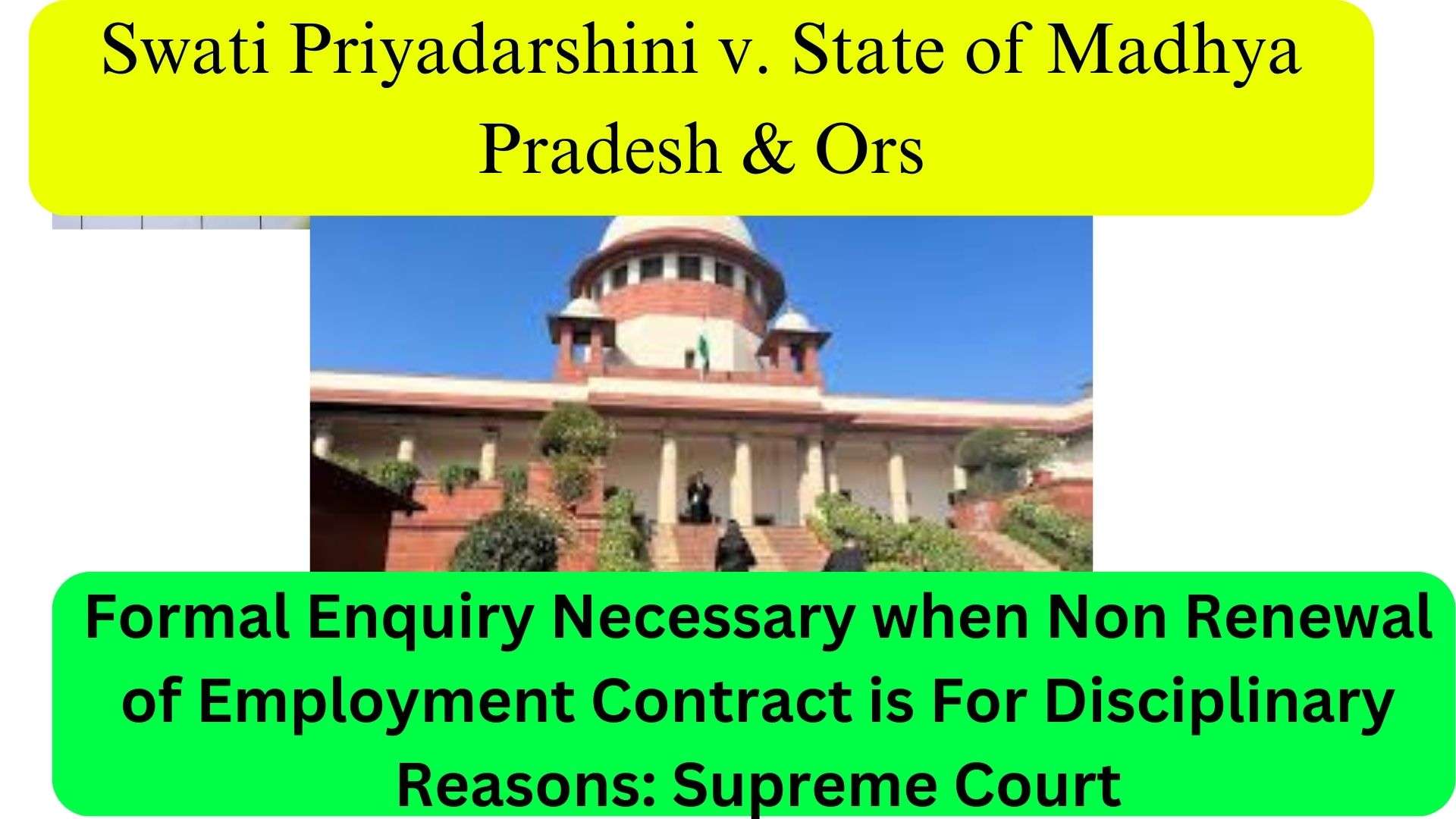The case analysis of Swati Priyadarshini v. State of Madhya Pradesh &Ors. (2024 INSC 620) conducted by Adv. Siddhant Jain.
I. Case Background
Swati Priyadarshini, the appellant, was appointed as an Assistant Project Coordinator (APC) under the Sarva Shiksha Abhiyan (SSA) on a contractual basis. Her contract was not renewed due to allegations of misconduct and inefficiency, leading to her termination. She challenged this termination, arguing it was stigmatic and violated the principles of natural justice.
II. Factual Matrix
Swati Priyadarshini began her role as APC on 15.10.2012 under SSA, initially for one academic session, with the possibility of renewal based on performance evaluation. She reported alleged misconduct at the Children with Special Needs (CWSN) Girls’ Hostel, Sehore, resulting in the termination of the Memorandum of Understanding with the NGO managing the hostel. On 09.01.2013, she was placed in charge of the hostel, but her charge was withdrawn five days later. Subsequently, she received two Show-Cause Notices (SCNs) for absenteeism, failure to perform duties, and improper conduct. On 30.03.2013, the District Appointment Committee chose not to renew her contract, citing unsatisfactory performance.
III. Legal Proceedings
Swati Priyadarshini filed a writ petition challenging the non-renewal of her contract. The Single Judge quashed the termination order on 20.06.2017, deeming it stigmatic and stating that it required a formal inquiry. The State of Madhya Pradesh appealed, and the Division Bench reversed the Single Judge’s ruling on 03.02.2020, holding that the termination was non-stigmatic and simply a non-renewal. The appellant then took her case to the Supreme Court, arguing that her termination was stigmatic and violated principles of natural justice.
IV. Appellant’s Submissions
- The appellant claimed her termination was stigmatic, as it was based on misconduct allegations that required an inquiry, which was not conducted.
- She argued that her contract under the Rajiv Gandhi Prathmik Shiksha Mission (RGPSM) rules required either a one-month notice or a fair opportunity to respond before termination.
- The appellant alleged that the termination was motivated by malafide intent, as she had exposed misconduct at the CWSN hostel, which the authorities wanted to cover up.
V. Respondents’ Submissions
- The State of Madhya Pradesh argued that the termination was non-stigmatic and based on unsatisfactory performance.
- The State claimed the termination was a simple non-renewal of a temporary contract.
- The respondents emphasized that the appellant’s temporary contract allowed for termination without prior notice if her performance was inadequate.
VI. Supreme Court’s Analysis and Conclusion
The Supreme Court found that the termination was indeed stigmatic. The order dated 30.03.2013 was the result of prior SCNs, indicating that the termination was linked to allegations of misconduct. The Court held that the Division Bench had erred in treating the order as non-stigmatic. The RGPSM rules mandated a one-month notice for termination due to inefficiency, which was not provided. If termination was based on misconduct, a proper inquiry was required.
Thus, the Court set aside the impugned Judgment and reinstated the Single Judge’s judgment with modifications. The appellant was granted notional continuation in service with 50 percent back wages. The Court denied the respondents the liberty to initiate fresh proceedings against her as previously allowed by the Single Judge. However, the respondents may take action in the future if necessary.
VII. Conclusion
The Supreme Court ruled in favor of Swati Priyadarshini, determining that her termination was stigmatic and violated principles of natural justice. This case emphasizes the need to adhere to contractual obligations and ensures that termination decisions are neither arbitrary nor driven by malafide intent.
If you have any legal queries or require legal assistance, you can book a consultation with me: “Click Here”

Meet Siddhant Jain — a lawyer who thrives in the dynamic world of Business & Commercial Law, Private Client Practice, and Maritime Matters. For him, boardrooms are battlefields, mergers are puzzles, and corporate jargon is a second language. Whether it’s navigating the maze of company law, tackling securities regulations, steering businesses through the stormy seas of bankruptcy and insolvency, or handling complex maritime disputes, Siddhant has done it all.
Beyond the corporate hustle, Siddhant also works closely with private clients — advising on wills, Trust, family settlements, agreements, and bespoke legal strategies to safeguard both business and personal interests.
From drafting intricate legal opinions on mergers to guiding company closures, and from advising shipping stakeholders to assisting families in succession planning, his practice spans a diverse legal spectrum. And when he’s not solving legal riddles, Siddhant shares his insights through newsletters and publications — because why should only his clients benefit from all that knowledge?
If you’re looking for someone who can untangle the knots of business law, safeguard your personal matters, or help you sail through maritime complexities (with a touch of humor along the way), Siddhant’s your guy.
📩 Reach him at siddhantjain2403@gmail.com
